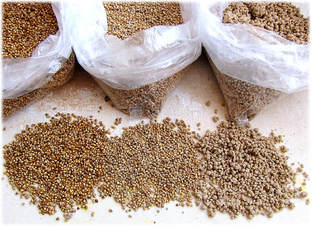The solution was to soak the grain in warm water with something acid in it such as vinegar or lemon juice for 12 hours. This would neutralize the phytic acid. I taught this approach to all my counseling clients and students.
Later on, I learned that if the whole grains were soaked 24 hours without an acid, it would have the same effect. I also started to recommend saving some of the brown rice soaking water to add as a starter in the next soaking batch. The idea was that the substance that neutralizes phytic acid is very low in brown rice. This was a strategy that could counter this.
Something puzzled me about the phytic acid. Among cultures that were generally free of our modern diseases and long lived, some always soaked grains in the above manner and some never did. I then found another piece to this puzzle.
Studies that were used to bolster the argument that unfermented or unsoaked grains caused mineral deficiencies were done on people who were extremely poor. These groups could not afford to include any animal source foods. When animal source foods are included in studies, the link between phytic acid and mineral deficiency decreases.
I saw visual diagnosis signs of mineral deficiencies in people following a vegan macrobiotic diet along with their illnesses such as arthritis, immune weakness and osteoporosis. All at once, it made sense. It was not the phytic acid alone that was causing problems in these people or the people studied, it was a nutritionally deficient diet that was the cause.
More pieces of the puzzle fell into place. I found evidence in scientific studies that the human gut can adapt to phytic acid rich foods. The small intestine of certain animals produces phytase, an enzyme that breaks down phytic acid and releases the minerals it binds. Humans are among these animals. Until recently it was thought that the production of phytase by the human small intestine is too low to have much effect. A 2015 study suggests that in fact our intestines can ramp up phytase production in response to a diet rich in phytic acid, and this eventually helps us absorb more minerals from seeds like whole grains.
That doesn’t mean phytic acid has no effect on mineral absorption in the long term—it still does, but our intestines are able to adapt over time and mitigate this effect along with an adequate diet, meaning that phytic acid eventually becomes less important. For people who are new to eating whole grains for the initial period, soaking them in the above manner can still be helpful.
I have continued to believe that whole grains need to be the center of one’s diet varying in amounts between 1/3 to 1/2 volume of daily eating. Mineral rich animal foods supplement and balance the phytic acid content of grains. Zinc and iron are high in naturally raised beef, chicken liver is high in iron, seafood and fish are high in an array of minerals. Raw cheese and yogurt from grass fed cows, sheep or goats are high in calcium. I think that the array of nutrients that are gotten in regular, but modest amounts of natural animal foods make the body function at a higher level which aids the proper intestinal production of phytase.
Phytic acid in grains are important for health. As a powerful antioxidant, phytic acid may reduce blood sugar, insulin, cholesterol, and triglycerides. It can be instrumental in reducing the risk of heart disease, diabetes, and obesity.
Despite initial concerns that phytate consumption might lead to calcium deficiency and weakened bones, studies show that it may actually protect against osteoporosis.
Quickly absorbed from the digestive tract, dietary phytates appear to be taken up by the body’s cancers cells and are shown to inhibit the growth of a variety of cancer cells – e.g. leukemia, colon, breast, cervical, prostate, liver, pancreatic, skin, and muscle. Even better, phytates seem to fight only cancerous cells, leaving the normal cells intact. Through a combination of antioxidant, anti-inflammatory and immune-enhancing activities, phytates block the formation of new blood vessels that might feed the tumors and disrupt pre-formed capillary vessels.
For those who don’t wish to include animal products in their diets, I feel it is important to take some key mineral and vitamin supplements along with focusing on eating a diet centered around cooked grains and vegetables along with other healthy vegetarian foods to avoid mineral and other deficiencies.
References
https://www.ncbi.nlm.nih.gov/pmc/articles/PMC1375699/
https://www.ncbi.nlm.nih.gov/pubmed/26041677
https://www.ncbi.nlm.nih.gov/labs/articles/27759065/




 RSS Feed
RSS Feed